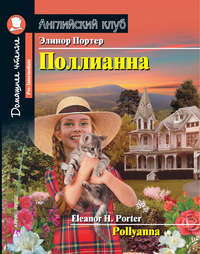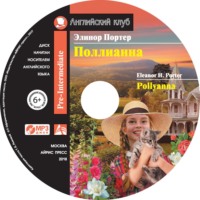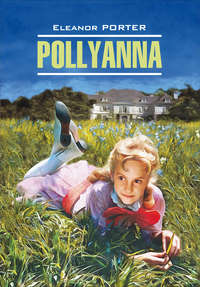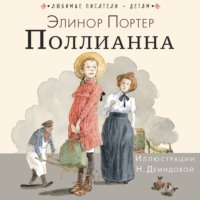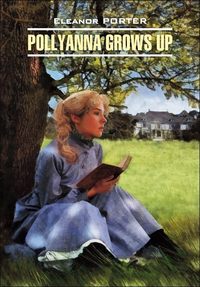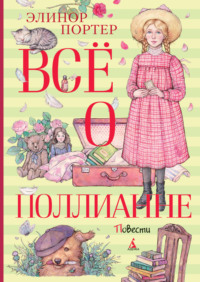
Полная версия
Pollyanna
Left alone, Pollyanna went back to her “picture,” as she mentally designated the beautiful view from the window. After a time she touched the sash tentatively. It seemed as if no longer could she endure the stifling heat. To her joy the sash moved under her fingers. The next moment the window was wide open, and Pollyanna was leaning far out, drinking in the fresh, sweet air.
She ran then to the other window. That, too, soon flew up under her eager hands. A big fly swept past her nose, and buzzed noisily about the room. Then another came, and another; but Pollyanna paid no heed. Pollyanna had made a wonderful discovery – against this window a huge tree flung great branches. To Pollyanna they looked like arms outstretched, inviting her. Suddenly she laughed aloud.
“I believe I can do it,” she chuckled. The next moment she had climbed nimbly to the window ledge. From there it was an easy matter to step to the nearest tree-branch. Then, clinging like a monkey, she swung herself from limb to limb until the lowest branch was reached. The drop to the ground was – even for Pollyanna, who was used to climbing trees – a little fearsome. She took it, however, with bated breath, swinging from her strong little arms, and landing on all fours in the soft grass. Then she picked herself up and looked eagerly about her.
She was at the back of the house. Before her lay a garden in which a bent old man was working. Beyond the garden a little path through an open field led up a steep hill, at the top of which a lone pine tree stood on guard beside the huge rock. To Pollyanna, at the moment, there seemed to be just one place in the world worth being in – the top of that big rock.
With a run and a skilful turn, Pollyanna skipped by the bent old man, threaded her way between the orderly rows of green growing things, and – a little out of breath – reached the path that ran through the open field. Then, determinedly, she began to climb. Already, however, she was thinking what a long, long way off that rock must be, when back at the window it had looked so near!
Fifteen minutes later the great clock in the hallway of the Harrington homestead struck six. At precisely the last stroke Nancy sounded the bell for supper.
One, two, three minutes passed. Miss Polly frowned and tapped the floor with her slipper. A little jerkily she rose to her feet, went into the hall, and looked up-stairs, plainly impatient. For a minute she listened intently; then she turned and swept into the dining room.
“Nancy,” she said with decision, as soon as the little serving-maid appeared; “my niece is late. No, you need not call her,” she added severely, as Nancy made a move toward the hall door. “I told her what time supper was, and now she will have to suffer the consequences. She may as well begin at once to learn to be punctual. When she comes down she may have bread and milk in the kitchen.”
“Yes, ma’am.” It was well, perhaps, that Miss Polly did not happen to be looking at Nancy’s face just then.
At the earliest possible moment after supper, Nancy crept up the back stairs and thence to the attic room.
“Bread and milk, indeed! – and when the poor lamb hain’t only just cried herself to sleep,” she was muttering fiercely, as she softly pushed open the door. The next moment she gave a frightened cry. “Where are you? Where’ve you gone? Where have you gone?” she panted, looking in the closet, under the bed, and even in the trunk and down the water pitcher. Then she flew down-stairs and out to Old Tom in the garden.
“Mr. Tom, Mr. Tom, that blessed child’s gone,” she wailed. “She’s vanished right up into Heaven where she come from, poor lamb – and me told ter give her bread and milk in the kitchen – her what’s eatin’ angel food this minute, I’ll warrant, I’ll warrant!”
The old man straightened up.
“Gone? Heaven?” he repeated stupidly, unconsciously sweeping the brilliant sunset sky with his gaze. He stopped, stared a moment intently, then turned with a slow grin. “Well, Nancy, it do look like as if she’d tried ter get as nigh Heaven as she could, and that’s a fact,” he agreed, pointing with a crooked finger to where, sharply outlined against the reddening sky, a slender, wind-blown figure was poised on top of a huge rock.
“Well, she ain’t goin’ ter Heaven that way ter-night – not if I has my say,” declared Nancy, doggedly. “If the mistress asks, tell her I ain’t furgettin’ the dishes, but I gone on a stroll,” she flung back over her shoulder, as she sped toward the path that led through the open field.
CHAPTER 5
The Game
“For the land’s sake, Miss Pollyanna, what a scare you did give me,” panted Nancy, hurrying up to the big rock, down which Pollyanna had just regretfully slid.
“Scare? Oh, I’m so sorry; but you mustn’t, really, ever get scared about me, Nancy. Father and the Ladies’ Aid used to do it, too, till they found I always came back all right.”
“But I didn’t even know you’d went,” cried Nancy, tucking the little girl’s hand under her arm and hurrying her down the hill. “I didn’t see you go, and nobody didn’t. I guess you flew right up through the roof; I do, I do.”
Pollyanna skipped gleefully.
“I did, ’most – only I flew down instead of up. I came down the tree.”
Nancy stopped short.
“You did – what?”
“Came down the tree, outside my window.”
“My stars and stockings!” gasped Nancy, hurrying on again. “I’d like ter know what yer aunt would say ter that!”
“Would you? Well, I’ll tell her, then, so you can find out,” promised the little girl, cheerfully.
“Mercy!” gasped Nancy. “No—no!”
“Why, you don’t mean she’d care!” cried Pollyanna, plainly disturbed.
“No—er—yes—well, never mind. I—I ain’t so very particular about knowin’ what she’d say, truly,” stammered Nancy, determined to keep one scolding from Pollyanna, if nothing more. “But, say, we better hurry. I’ve got ter get them dishes done, ye know.”
“I’ll help,” promised Pollyanna, promptly.
“Oh, Miss Pollyanna!” demurred Nancy.
For a moment there was silence. The sky was darkening fast. Pollyanna took a firmer hold of her friend’s arm.
“I reckon I’m glad, after all, that you did get scared – a little, ’cause then you came after me,” she shivered.
“Poor little lamb! And you must be hungry, too. I—I’m afraid you’ll have ter have bread and milk in the kitchen with me. Yer aunt didn’t like it – because you didn’t come down ter supper, ye know.”
“But I couldn’t. I was up here.”
“Yes; but – she didn’t know that, you see!” observed Nancy, dryly, stifling a chuckle. “I’m sorry about the bread and milk; I am, I am.”
“Oh, I’m not. I’m glad.”
“Glad! Why?”
“Why, I like bread and milk, and I’d like to eat with you. I don’t see any trouble about being glad about that.”
“You don’t seem ter see any trouble bein’ glad about everythin’,” retorted Nancy, choking a little over her remembrance of Pollyanna’s brave attempts to like the bare little attic room.
Pollyanna laughed softly.
“Well, that’s the game, you know, anyway.”
“The – game?”
“Yes; the ‘just being glad’ game.”
“Whatever in the world are you talkin’ about?”
“Why, it’s a game. Father told it to me, and it’s lovely,” rejoined Pollyanna. “We’ve played it always, ever since I was a little, little girl. I told the Ladies’ Aid, and they played it – some of them.”
“What is it? I ain’t much on games, though.”
Pollyanna laughed again, but she sighed, too; and in the gathering twilight her face looked thin and wistful.
“Why, we began it on some crutches that came in a missionary barrel.”
“Crutches!”
“Yes. You see I’d wanted a doll, and father had written them so; but when the barrel came the lady wrote that there hadn’t any dolls come in, but the little crutches had. So she sent ’em along as they might come in handy for some child, sometime. And that’s when we began it.”
“Well, I must say I can’t see any game about that, about that,” declared Nancy, almost irritably.
“Oh, yes; the game was to just find something about everything to be glad about – no matter what ’twas,” rejoined Pollyanna, earnestly. “And we began right then – on the crutches.”
“Well, goodness me! I can’t see anythin’ ter be glad about – gettin’ a pair of crutches when you wanted a doll!”
Pollyanna clapped her hands.
“There is – there is,” she crowed. “But I couldn’t see it, either, Nancy, at first,” she added, with quick honesty. “Father had to tell it to me.”
“Well, then, suppose you tell ME,” almost snapped Nancy.
“Goosey! Why, just be glad because you don’t – need – ’em!” exulted Pollyanna, triumphantly. “You see it’s just as easy – when you know how!”
“Well, of all the queer doin’s!” breathed Nancy, regarding Pollyanna with almost fearful eyes.
“Oh, but it isn’t queer – it’s lovely,” maintained Pollyanna enthusiastically. “And we’ve played it ever since. And the harder ’tis, the more fun ’tis to get ’em out; only – only sometimes it’s almost too hard – like when your father goes to Heaven, and there isn’t anybody but a Ladies’ Aid left.”
“Yes, or when you’re put in a snippy little room ’way at the top of the house with nothin’ in it,” growled Nancy.
Pollyanna sighed.
“That was a hard one, at first,” she admitted, “specially when I was so kind of lonesome. I just didn’t feel like playing the game, anyway, and I had been wanting pretty things, so! Then I happened to think how I hated to see my freckles in the looking-glass, and I saw that lovely picture out the window, too; so then I knew I’d found the things to be glad about. You see, when you’re hunting for the glad things, you sort of forget the other kind – like the doll you wanted, you know.”
“Humph!” choked Nancy, trying to swallow the lump in her throat.
“Most generally it doesn’t take so long,” sighed Pollyanna; “and lots of times now I just think of them without thinking, you know. I’ve got so used to playing it. It’s a lovely game. F-father and I used to like it so much,” she faltered. “I suppose, though, it—it’ll be a little harder now, as long as I haven’t anybody to play it with. Maybe Aunt Polly will play it, though,” she added, as an after-thought.
“My stars and stockings! – her!” breathed Nancy, behind her teeth. Then, aloud, she said doggedly: “See here, Miss Pollyanna, I ain’t sayin’ that I’ll play it very well, and I ain’t sayin’ that I know how, anyway; but I’ll play it with ye, after a fashion – I just will, I will!”
“Oh, Nancy!” exulted Pollyanna, giving her a rapturous hug. “That’ll be splendid! Won’t we have fun?”
“Er—maybe,” conceded Nancy, in open doubt. “But you mustn’t count too much on me, ye know. I never was no case fur games, but I’m a-goin’ ter make a most awful old try on this one. You’re goin’ ter have some one ter play it with, anyhow,” she finished, as they entered the kitchen together.
Pollyanna ate her bread and milk with good appetite; then, at Nancy’s suggestion, she went into the sitting room, where her aunt sat reading. Miss Polly looked up coldly.
“Have you had your supper, Pollyanna?”
“Yes, Aunt Polly.”
“I’m very sorry, Pollyanna, to have been obliged so soon to send you into the kitchen to eat bread and milk.”
“But I was real glad you did it, Aunt Polly. I like bread and milk, and Nancy, too. You mustn’t feel bad about that one bit.”
Aunt Polly sat suddenly a little more erect in her chair.
“Pollyanna, it’s quite time you were in bed. You have had a hard day, and to-morrow we must plan your hours and go over your clothing to see what it is necessary to get for you. Nancy will give you a candle. Be careful how you handle it. Breakfast will be at half-past seven. See that you are down to that. Good-night.”
Quite as a matter of course, Pollyanna came straight to her aunt’s side and gave her an affectionate hug.
“I’ve had such a beautiful time, so far,” she sighed happily. “I know I’m going to just love living with you but then, I knew I should before I came. Good-night,” she called cheerfully, as she ran from the room.
“Well, upon my soul!” ejaculated Miss Polly, half aloud. “What a most extraordinary child!” Then she frowned. “She’s ‘glad’ I punished her, and I ‘mustn’t feel bad one bit,’ and she’s going to ‘love to live’ with me! Well, upon my soul!” ejaculated Miss Polly again, as she took up her book.
Fifteen minutes later, in the attic room, a lonely little girl sobbed into the tightly-clutched sheet:
“I know, father-among-the-angels, I’m not playing the game one bit now – not one bit; but I don’t believe even you could find anything to be glad about sleeping all alone ’way off up here in the dark – like this. If only I was near Nancy or Aunt Polly, or even a Ladies’ Aider, it would be easier!”
Down-stairs in the kitchen, Nancy, hurrying with her belated work, jabbed her dish-mop into the milk pitcher, and muttered jerkily:
“If playin’ a silly-fool game – about bein’ glad you’ve got crutches when you want dolls – is got ter be – my way – o’ bein’ that rock o’ refuge – why, I’m a-goin’ ter play it – I am, I am!”
CHAPTER 6
A Question of Duty
It was nearly seven o’clock when Pollyanna awoke that first day after her arrival. Her windows faced the south and the west, so she could not see the sun yet; but she could see the hazy blue of the morning sky, and she knew that the day promised to be a fair one.
The little room was cooler now, and the air blew in fresh and sweet. Outside, the birds were twittering joyously, and Pollyanna flew to the window to talk to them. She saw then that down in the garden her aunt was already out among the rosebushes. With rapid fingers, therefore, she made herself ready to join her.
Down the attic stairs sped Pollyanna, leaving both doors wide open. Through the hall, down the next flight, then bang through the front screened-door and around to the garden, she ran.
Aunt Polly, with the bent old man, was leaning over a rose-bush when Pollyanna, gurgling with delight, flung herself upon her.
“Oh, Aunt Polly, Aunt Polly, I reckon I am glad this morning just to be alive!”
“Pollyanna!” remonstrated the lady, sternly, pulling herself as erect as she could with a dragging weight of ninety pounds hanging about her neck. “Is this the usual way you say good morning?”
The little girl dropped to her toes, and danced lightly up and down.
“No, only when I love folks so I just can’t help it! I saw you from my window, Aunt Polly, and I got to thinking how you weren’t a Ladies’ Aider, and you were my really truly aunt; and you looked so good I just had to come down and hug you!”
The bent old man turned his back suddenly. Miss Polly attempted a frown – with not her usual success.
“Pollyanna, you – I Thomas, that will do for this morning. I think you understand – about those rose-bushes,” she said stiffly. Then she turned and walked rapidly away.
“Do you always work in the garden, Mr.—Man?” asked Pollyanna, interestedly.
The man turned. His lips were twitching, but his eyes looked blurred as if with tears.
“Yes, Miss. I’m Old Tom, the gardener,” he answered. Timidly, but as if impelled by an irresistible force, he reached out a shaking hand and let it rest for a moment on her bright hair. “You are so like your mother, little Miss! I used ter know her when she was even littler than you be. You see, I used ter work in the garden – then.”
Pollyanna caught her breath audibly.
“You did? And you knew my mother, really – when she was just a little earth angel, and not a Heaven one? Oh, please tell me about her!” And down plumped Pollyanna in the middle of the dirt path by the old man’s side.
A bell sounded from the house. The next moment Nancy was seen flying out the back door.
“Miss Pollyanna, that bell means breakfast – mornin’s,” she panted, pulling the little girl to her feet and hurrying her back to the house; “and other times it means other meals. But it always means that you’re ter run like time when ye hear it, no matter where ye be. If ye don’t – well, it’ll take somethin’ smarter’n we be ter find anythin’ ter be glad about in that!” she finished, shooing Pollyanna into the house as she would shoo an unruly chicken into a coop.
Breakfast, for the first five minutes, was a silent meal; then Miss Polly, her disapproving eyes following the airy wings of two flies darting here and there over the table, said sternly:
“Nancy, where did those flies come from?”
“I don’t know, ma’am. There wasn’t one in the kitchen.” Nancy had been too excited to notice Pollyanna’s up-flung windows the afternoon before.
“I reckon maybe they’re my flies, Aunt Polly,” observed Pollyanna, amiably. “There were lots of them this morning having a beautiful time upstairs.”
Nancy left the room precipitately, though to do so she had to carry out the hot muffins she had just brought in.
“Yours!” gasped Miss Polly. “What do you mean? Where did they come from?”
“Why, Aunt Polly, they came from out of doors of course, through the windows. I saw some of them come in.”
“You saw them! You mean you raised those windows without any screens?”
“Why, yes. There weren’t any screens there, Aunt Polly.”
Nancy, at this moment, came in again with the muffins. Her face was grave, but very red.
“Nancy,” directed her mistress, sharply, “you may set the muffins down and go at once to Miss Pollyanna’s room and shut the windows. Shut the doors, also. Later, when your morning work is done, go through every room with the spatter. See that you make a thorough search.”
To her niece she said:
“Pollyanna, I have ordered screens for those windows. I knew, of course, that it was my duty to do that. But it seems to me that you have quite forgotten your duty.”
“My – duty?” Pollyanna’s eyes were wide with wonder.
“Certainly. I know it is warm, but I consider it your duty to keep your windows closed till those screens come. Flies, Pollyanna, are not only unclean and annoying, but very dangerous to health. After breakfast I will give you a little pamphlet on this matter to read.”
“To read? Oh, thank you, Aunt Polly. I love to read!”
Miss Polly drew in her breath audibly, then she shut her lips together hard. Pollyanna, seeing her stern face, frowned a little thoughtfully.
“Of course I’m sorry about the duty I forgot, Aunt Polly,” she apologized timidly. “I won’t raise the windows again.”
Her aunt made no reply. She did not speak, indeed, until the meal was over. Then she rose, went to the bookcase in the sitting room, took out a small paper booklet, and crossed the room to her niece’s side.
“This is the article I spoke of, Pollyanna. I desire you to go to your room at once and read it. I will be up in half an hour to look over your things.”
Pollyanna, her eyes on the illustration of a fly’s head, many times magnified, cried joyously:
“Oh, thank you, Aunt Polly!” The next moment she skipped merrily from the room, banging the door behind her.
Miss Polly frowned, hesitated, then crossed the room majestically and opened the door; but Pollyanna was already out of sight, clattering up the attic stairs.
Half an hour later when Miss Polly, her face expressing stern duty in every line, climbed those stairs and entered Pollyanna’s room, she was greeted with a burst of eager enthusiasm.
“Oh, Aunt Polly, I never saw anything so perfectly lovely and interesting in my life. I’m so glad you gave me that book to read! Why, I didn’t suppose flies could carry such a lot of things on their feet, and—”
“That will do,” observed Aunt Polly, with dignity. “Pollyanna, you may bring out your clothes now, and I will look them over. What are not suitable for you I shall give to the Sullivans, of course.”
With visible reluctance Pollyanna laid down the pamphlet and turned toward the closet.
“I’m afraid you’ll think they’re worse than the Ladies’ Aid did – and they said they were shameful,” she sighed. “But there were mostly things for boys and older folks in the last two or three barrels; and – did you ever have a missionary barrel, Aunt Polly?”
At her aunt’s look of shocked anger, Pollyanna corrected herself at once.
“Why, no, of course you didn’t, Aunt Polly!” she hurried on, with a hot blush. “I forgot; rich folks never have to have them. But you see sometimes I kind of forget that you are rich – up here in this room, you know.”
Miss Polly’s lips parted indignantly, but no words came. Pollyanna, plainly unaware that she had said anything in the least unpleasant, was hurrying on.
“Well, as I was going to say, you can’t tell a thing about missionary barrels – except that you won’t find in ’em what you think you’re going to – even when you think you won’t. It was the barrels every time, too, that were hardest to play the game on, for father and—”
Just in time Pollyanna remembered that she was not to talk of her father to her aunt. She dived into her closet then, hurriedly, and brought out all the poor little dresses in both her arms.
“They aren’t nice, at all,” she choked, “and they’d been black if it hadn’t been for the red carpet for the church; but they’re all I’ve got.”
With the tips of her fingers Miss Polly turned over the conglomerate garments, so obviously made for anybody but Pollyanna. Next she bestowed frowning attention on the patched undergarments in the bureau drawers.
“I’ve got the best ones on,” confessed Pollyanna, anxiously. “The Ladies’ Aid bought me one set straight through all whole. Mrs. Jones – she’s the president – told ’em I should have that if they had to clatter down bare aisles themselves the rest of their days. But they won’t. Mr. White doesn’t like the noise. He’s got nerves, his wife says; but he’s got money, too, and they expect he’ll give a lot toward the carpet – on account of the nerves, you know. I should think he’d be glad that if he did have the nerves he’d got money, too; shouldn’t you?”
Miss Polly did not seem to hear. Her scrutiny of the undergarments finished, she turned to Pollyanna somewhat abruptly.
“You have been to school, of course, Pollyanna?”
“Oh, yes, Aunt Polly. Besides, fath – I mean, I was taught at home some, too.”
Miss Polly frowned.
“Very good. In the fall you will enter school here, of course. Mr. Hall, the principal, will doubtless settle in which grade you belong. Meanwhile, I suppose I ought to hear you read aloud half an hour each day.”
“I love to read; but if you don’t want to hear me I’d be just glad to read to myself – truly, Aunt Polly. And I wouldn’t have to half try to be glad, either, for I like best to read to myself – on account of the big words, you know.”
“I don’t doubt it,” rejoined Miss Polly, grimly. “Have you studied music?”
“Not much. I don’t like my music – I like other people’s, though. I learned to play on the piano a little. Miss Gray – she plays for church – she taught me. But I’d just as soon let that go as not, Aunt Polly. I’d rather, truly.”
“Very likely,” observed Aunt Polly, with slightly uplifted eyebrows. “Nevertheless I think it is my duty to see that you are properly instructed in at least the rudiments of music. You sew, of course.”
“Yes, ma’am.” Pollyanna sighed. “The Ladies’ Aid taught me that. But I had an awful time. Mrs. Jones didn’t believe in holding your needle like the rest of ’em did on buttonholing, and Mrs. White thought backstitching ought to be taught you before hemming (or else the other way), and Mrs. Harriman didn’t believe in putting you on patchwork ever, at all.”
“Well, there will be no difficulty of that kind any longer, Pollyanna. I shall teach you sewing myself, of course. You do not know how to cook, I presume.”



